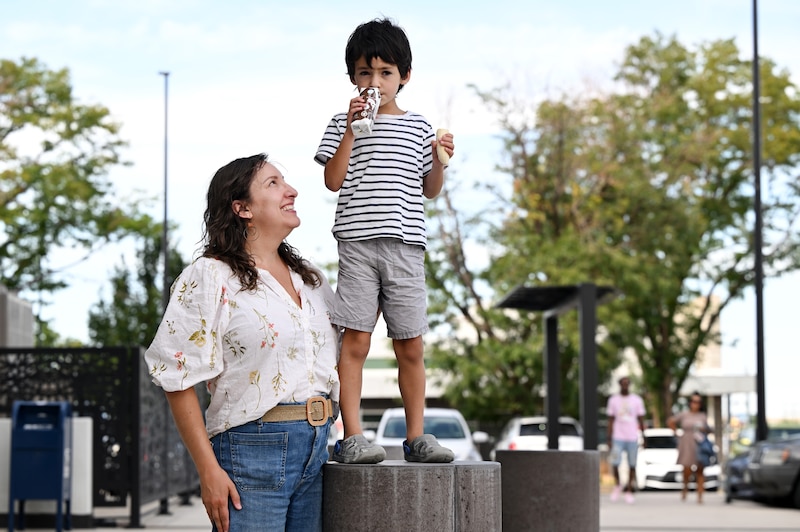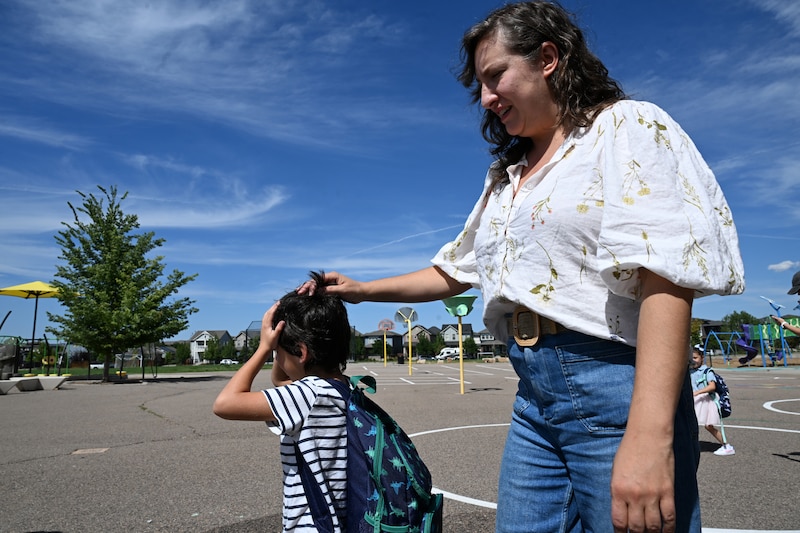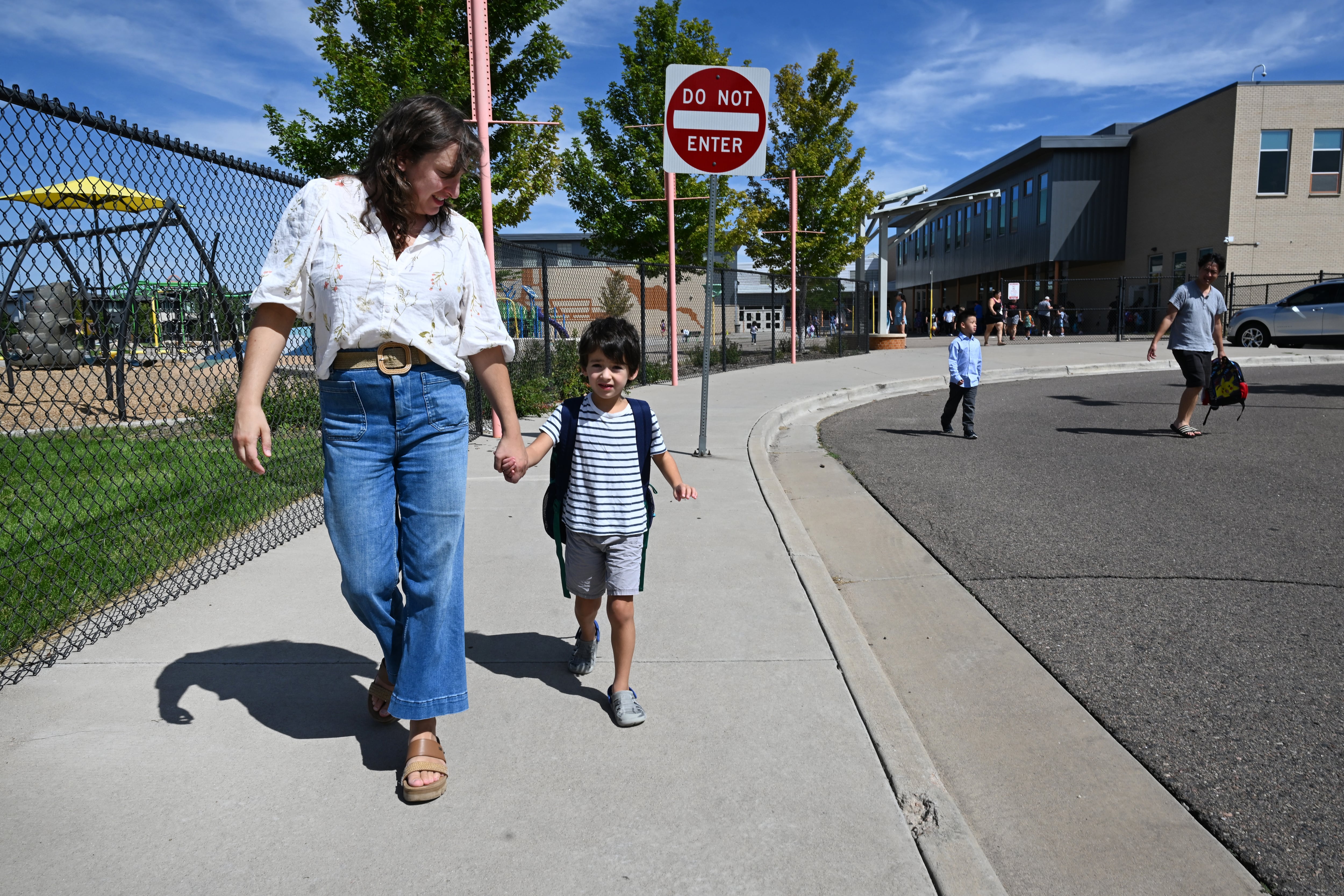Sign up for Chalkbeat Colorado’s free daily newsletter to get the latest reporting from us, plus curated news from other Colorado outlets, delivered to your inbox.
Every day, Ileana Sadin picks up her 5-year-old son Julian from kindergarten in Denver and drives him to a therapy clinic. Julian has autism, and his pediatrician has prescribed 35 hours of applied behavior analysis, or ABA therapy, per week to help Julian communicate.
But Julian doesn’t get nearly that many hours of therapy. At most, he gets 10 a week after school.
Denver Public Schools has refused his parents’ request for a private ABA provider to work with Julian in his kindergarten classroom, even though the family’s private insurance would pay for it.
Without ABA therapy in school, Julian’s parents worry he is losing skills. Before he enrolled in public school, an ABA therapist helped Julian participate in lessons at his day care, his parents said. Julian learned the alphabet and could count to 20 in English and Spanish.
When Julian transitioned to public school, his parents were told, “‘He’s making progress. He can count to 10 now,’” Julian’s father, Joshua Kurdys, recalled. “He could count to 20 a year and a half ago. That says something to me.”
A 2022 state law was intended to make it easier for students to get ABA therapy in schools. But ultimately it was watered down to require only that districts have a policy that addresses how a student with a prescription for “medically necessary services” receives those services in school.
Parents and advocates say that has led to an uneven experience for families across school districts and less support for students, some of whom end up quietly lost in the shuffle while others end up in a loop of frustration, explosive behavior, and suspension from school.
While Denver is following the letter of the law, parents and advocates allege, it’s not following the spirit. Advocate Meryl Duguay called Denver’s policy and process “a show to get to a no.”
Meredith Fatseas, the Denver district’s director of mental health services, said the district looks at each student’s case individually and that its process is “rooted in inclusive and equitable practices.”
“When requests come in, we are taking them seriously,” Fatseas said. “It’s not a rubber stamp.
“We are committed to the obligation of meeting students’ individual needs in the education setting, which is why we’ve taken a stance of owning this process,” she said.
Data shows Denver Public Schools says no more often
ABA uses rewards to reinforce behavior. If a child sits in circle time, works on a math problem, or takes turns with a peer, for example, they are given a reward like a high five or a favorite toy. It’s often recommended for children with autism to help them communicate, interact with others, and manage frustration.
Denver Public Schools’ policy says the decision of whether to allow an outside ABA therapist into the classroom is up to the team that develops a student’s individualized education program or IEP. An IEP lists academic and other goals for students with disabilities and the services the school district must provide. The IEP team includes district and school staff as well as the student’s parents, though the district ultimately writes the IEP.
If parents disagree with anything in the IEP, their recourse is to file a due process complaint with the state, which many families see as daunting and potentially costly.
Data obtained by Chalkbeat in an open records request shows that last school year, Denver Public Schools, the largest school district in the state with 88,000 students, received 28 requests for ABA therapy in school and granted only three, or about 11%.
Other big Colorado districts said yes more often. Jeffco Public Schools, Douglas County School District, and Cherry Creek School District granted all of the requests for ABA therapy they received last school year. Aurora Public Schools granted half the requests it received in the last three years.
Fatseas said Denver’s rate doesn’t take into account approvals made through a second, long-standing process that allows parents to request a private provider work with their child during non-instructional time only, such as art class or recess. The requests are meant to be for services that are not medically necessary.
Those types of requests are made at the school level, and the district doesn’t track how many are received or granted by individual school principals, Fatseas said.
But advocates who work on behalf of students with disabilities said that in their experience, fewer requests are granted now than were before the 2022 law and the district’s new policy.
“It’s as if after we shed light on it, trying to give access to all students who might need this service, they’re more rigid,” said Duguay, an education consultant who helped push for the 2022 law.
Pam Bisceglia, executive director of the nonprofit Advocacy Denver, said that as of last school year, she had worked with at least 15 families who had requested ABA services for their child. The district only granted one request, and only after Bisceglia asked for an outside mediator to be brought in.

Bill set out to find ‘a path to yes’
Families’ frustration drove the 2022 Colorado state law. Originally the bill, known as HB 22-1260, would have required districts to allow ABA in school. The 2022 bill was the second attempt after a first attempt in 2020 got derailed by the pandemic.
“When parents approach schools with a prescription, they are often told no,” state Rep. Meg Froelich, who sponsored the bill, said at the first hearing in April 2022.
“We are here to find a path to yes,” said Froelich, a Democrat who represents Englewood, Sheridan, Cherry Hills Village, and part of Denver.
But now, Froelich said, it’s clear that the law isn’t always working as intended.
“We’re a local control state, so the prevailing wisdom is you can’t tell school boards what to do,” Froelich said in an interview. “We tried to write [the bill] that the path can’t be, ‘We don’t do that here.’ But there are too many ways the school can essentially say no while appearing not to.”
The first hearing on the 2022 bill lasted seven hours. The testimony provides an in-depth look at the desperation and frustration of parents who believe ABA therapy benefits their children, and the qualms and concerns of school districts hesitant to let outside providers in.
Elizabeth Schmidt told state lawmakers that because her third grade son didn’t have the support he needed, he’d been suspended from his suburban school district 12 times in a four-month span.
“He has had the cops called on him, he has been secluded, locked in rooms, and has had a school administrator who believes he has a right to put his hands on him to gain compliance,” she said.
Parent Laura Kornmueller testified that her son’s school refused to allow his ABA therapist into the classroom but told her she was welcome to pull her son out of class to go to his ABA clinic.
Right before her son’s kindergarten graduation ceremony, she said the principal told her that her son would be held back in kindergarten because he’d missed too much school.
“They said he can leave school to get the therapy he needs,” said Kornmueller, who didn’t name the district her son attends. “Then he was punished for not attending school. So which is it?”
Other parents said they too felt forced to choose between ABA therapy and school. The few who’d gotten ABA therapy in the classroom said it happened because of a lawsuit or a mistake.
Sandy Mikesell said her son’s principal didn’t know she was “violating an unwritten district edict” when she allowed an ABA provider into the school, which is located in a suburban district.
Mikesell said her son went from spending 80% of his day in the mental health office, where he missed his academic lessons, to being able to stay in the classroom. Although the district caught wind of the situation and tried to cut off the ABA services, Mikesell said her family had the data to show the therapy worked.
School districts raised concerns
Meanwhile, school officials said allowing outside ABA providers into classrooms would be disruptive and distracting to both the student receiving the therapy and their classmates. ABA therapy could also interfere with other special education services, they said.
Callan Ware, the executive director of student services for Englewood Schools, asked lawmakers to imagine a second grader whose IEP says they must receive speech therapy, occupational therapy, and mental health services.
If the student misses their mental health services because they’re working with their ABA provider, Ware said, “who needs to make that up?”
“We aren’t allowed to give up our services so an outside provider can come in to give their services,” said Lisa Humberd, then the executive director of special education for Widefield School District 3 and now head of the Consortium of Directors of Special Education.
Providers testified that’s not how ABA therapy works. It’s not a separate therapy delivered in an office, they said, but supports the student to participate in classroom lessons.
But districts also argued that allowing outside providers into schools could be a liability. Other parents might not want a strange adult in the classroom, they said. And while a child’s pediatrician may decide ABA therapy is necessary, the child’s special education teachers may not think so.
Michelle Murphy, executive director of the Colorado Rural Schools Alliance, said the bill would raise “very real legal concerns for schools” if they were forced to allow in medically necessary services. She noted that she was putting “medically necessary services” in air quotes.
ABA therapy is controversial. Nationwide, some parents have accused ABA providers of being overzealous or even abusive to their children, and some autistic adults have said the premise of ABA therapy forces people with autism to conform to societal norms in a harmful way.
But the controversy didn’t seem to play a role in Colorado lawmakers’ decision. The objections of the school districts did. To appease them, Froelich amended her bill. Instead of requiring districts to allow medically necessary services in school, the bill required districts to have a policy.
“As with all things, our original intent in the bill was to be very much more forceful and to say, ‘You have to allow this and you can’t say no,’” Froelich explained when introducing her amendments.
“I think we will probably revisit this if parents are finding they can’t quite get what they need or the policy isn’t addressing certain circumstances,” she told fellow lawmakers in 2022.
Two years later, Froelich is frustrated.
“You do this victory lap when you pass it,” she said in an interview, referring to this bill and others, “and then you realize the implementation is 20 times harder than it should be.”
In Froelich’s mind, IEP teams should not be making the decision about whether to allow ABA therapy providers into the classroom. She has asked the Colorado Attorney General’s Office to issue an opinion to that effect. A spokesperson said they’d received the request and are looking into it.
Froelich has also asked the Colorado Department of Education to issue new guidance. A spokesperson said the department is “working with districts and other stakeholders to review how the current guidance might need to be clarified or updated.”

In kindergarten and still without therapy services
Chalkbeat spoke with three families whose children have a prescription for ABA therapy. All three requested an outside ABA provider be allowed to serve their child in the classroom, at the expense of their private insurance. All three were denied by Denver Public Schools.
Two of the families did not want their names used in this story for fear of retaliation by the district.
All three families said they went through DPS’ process. As described by Fatseas, the district’s director of mental health services, the process involves an evaluation by a board certified behavior analyst, or BCBA, who works for Denver Public Schools. A BCBA is one type of professional who can provide ABA therapy.
The district’s BCBA interviews the student’s pediatrician and their outside ABA therapist. The BCBA also observes the child at school, reviews their records, and collaborates with other special education teachers and school-based providers to write a recommendation for the IEP team.
Julian’s parents said DPS didn’t follow that process in their son’s case. District officials said the process has evolved over time. But even when DPS did adhere to its current process, as happened with the other two families, the district still said no.
Fatseas said ABA theory is baked into the interventions that all Denver school-based mental health staff use with students, even if they’re not providing one-on-one ABA therapy. With requests for outside ABA providers to come into the classroom, Fatseas said the question the district tries to answer is whether the service is necessary for the student to make progress toward their IEP goals.
In Julian’s case, DPS said it wasn’t.
Julian is a sweet 5-year-old whose mother describes him as agreeable. He struggles with communication, social skills, and learning, but he doesn’t lash out in frustration.
Unlike some children with autism, Julian can speak. But his speech is mostly phrases he’s memorized. On a recent drive to his after-school therapy, Julian sat in his car seat with a banana and a chocolate milk, marveling at the trucks on the highway.
“UPS truck!” he said. “That’s a big one! Orange semi truck! That’s a big one!”
According to IEP documents provided to Chalkbeat by Julian’s parents, DPS rejected the family’s request for an outside ABA provider because Julian was making progress without one. But his parents wonder if Julian could be making more progress with help from an ABA therapist.
Julian’s most recent IEP, from June, noted that he had increased the frequency with which he took turns with a peer and shared toys from zero out of five attempts to one out of five attempts.
“They’re like, ‘Learning happened! See?’” Kurdys, Julian’s father, said in an interview.
Julian’s parents said they believe DPS set Julian’s baseline so low — at zero — that it would be impossible for him not to make progress. DPS said it could not comment on individual students.
Advocates said low baselines are a common problem.
“The bar is so low, they’re not considering what a student is actually capable of and should be achieving,” said Duguay, who does not work with Julian’s family but has worked with several other families whose requests for ABA have been denied.
In IEP meetings, Julian’s parents pushed back. But so far, DPS has stuck to its denial.
“I don’t know how we can say with a straight face he doesn’t need ABA therapy,” Sadin, Julian’s mother, said in one IEP meeting, according to a recording provided to Chalkbeat. She was reacting to test scores that showed Julian was in the bottom first percentile for academic skills.
“He has such problems with communication, it’s not easy to elicit what he usually knows,” she said in the meeting. “Not to harp on the ABA, but this is what ABA is about.”
Melanie Asmar is the bureau chief for Chalkbeat Colorado. Contact Melanie at masmar@chalkbeat.org .






